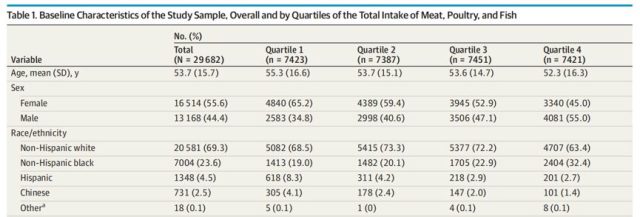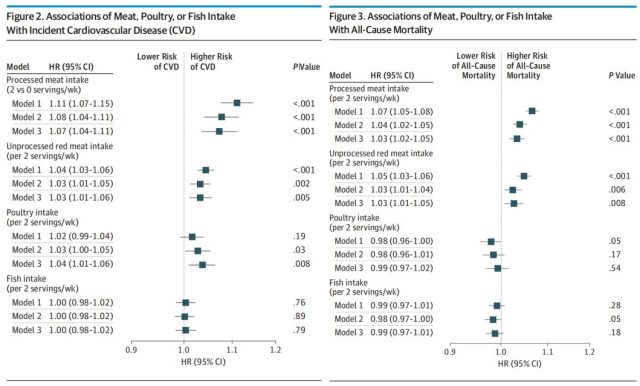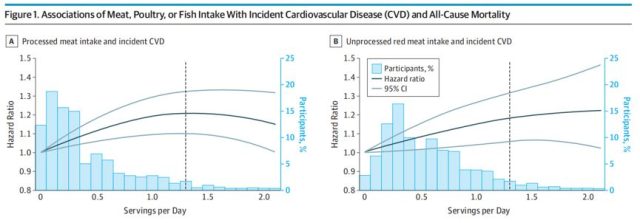Eating red and processed meats increase risks of heart disease and death!
- Statins Lower Blood Lipids: How Long is a Course?
- Warning: Smartwatch Blood Sugar Measurement Deemed Dangerous
- Mifepristone: A Safe and Effective Abortion Option Amidst Controversy
- Asbestos Detected in Buildings Damaged in Ukraine: Analyzed by Japanese Company
- New Ocrevus Subcutaneous Injection Therapy Shows Promising Results in Multiple Sclerosis Treatmen
- Dutch Man Infected with COVID-19 for 613 Days Dies: Accumulating Over 50 Virus Mutations
Eating red and processed meats increase risks of heart disease and death!
- Red Yeast Rice Scare Grips Japan: Over 114 Hospitalized and 5 Deaths
- Long COVID Brain Fog: Blood-Brain Barrier Damage and Persistent Inflammation
- FDA has mandated a top-level black box warning for all marketed CAR-T therapies
- Can people with high blood pressure eat peanuts?
- What is the difference between dopamine and dobutamine?
- How long can the patient live after heart stent surgery?
JAMA Intrrnal Medicine: Eating red and processed meats increase risks of heart disease and death! Fish and poultry are not.
Abstract: A large survey study in a JAMA sub-journal showed that intake of processed and unprocessed red meat was significantly associated with cardiovascular disease and all-cause mortality , while fish intake was not significantly associated with cardiovascular disease.
Fish and poultry meat intake was not significantly associated with all-cause mortality.
With the progress of society, people’s life pace is getting faster and faster, and the phenomenon of ordering takeout and eating fast food is also very common. It seems that a balanced diet cannot be guaranteed in this situation.
As the saying goes, when a person is sick, three points are medicines and seven points are nourishment. Most of the time, this ” nurture ” refers to diet therapy.
In fact, it is not only the sickness that should pay attention to the diet, but the daily daily diet is more important.
Many chronic metabolic diseases, such as obesity and cardiovascular disease, are caused by improper eating habits. It can be seen that the amount, type and combination of food intake plays a vital role in human health.
In February 2020, JAMA Internal Medicine , a sub-issue of JAMA , one of the four major international medical journals , published a research paper on the impact of diet on heart disease morbidity and mortality risk – Associations of Processed Meat, Unprocessed Red Meat , Poultry, or Fish Intake With Incident Cardiovascular Disease and All-Cause Mortality .
The study, conducted by Victor Zhong , Department of Nutritional Sciences, Cornell University, and Norrina Allen , Northwestern University Feinberg School of Medicine , found that red and processed meat consumption increases heart disease and death risk. .
Fish intake was not significantly associated with cardiovascular disease; processed meat intake or unprocessed red meat was significantly associated with cardiovascular disease and all-cause mortality; poultry intake or fish intake was not significantly associated with all-cause mortality sex.

Processed meat , unprocessed red meat , poultry , and fish are major components of the U.S. diet, accounting for more than 40 percent of adult protein intake, 42 percent of dietary cholesterol intake, and 26 percent of total energy intake.
Survey data show that the average consumption of processed meat and fish did not change from 1999 to 2016, while the average U.S. adult consumption of unprocessed red meat decreased and the average consumption of poultry increased.
In November, a controversial meta-analysis suggested that people don’t need to reduce their intake of red and processed meat.
However, previous studies have shown a positive association between processed meat intake and cardiovascular disease (CVD) and mortality , but unprocessed red meat, poultry or fish intake is associated with cardiovascular disease and mortality The correlation between them remains uncertain, due to the heterogeneity of the studies and the limitations of the research methods, which also prompted the research team of this paper to conduct a long-term prospective study.
To address the above research gaps, the researchers pooled a large and diverse sample from six cohorts, including long-term follow-up data up to 30 years , harmonized dietary data to reduce heterogeneity, adjusted for a comprehensive set of confounders, and performed multiple sensitivity Sexual Analysis.

Among 29,682 participants (mean age, 53.7 years; 44.4% male; 30.7% non-white) , 6963 cardiovascular events and 8875 all-cause deaths were adjudicated during a mean follow-up of 19.0 years (14.1-23.7) .
The findings of the study showed that fish intake was not significantly associated with cardiovascular disease; processed meat intake or unprocessed red meat was significantly associated with cardiovascular disease and all-cause mortality; poultry intake or fish intake was significantly associated with all-cause mortality Mortality was not significantly associated.

The study found that eating two servings of red meat, processed meat or poultry (but not fish) per week was associated with a 3% to 7% higher risk of cardiovascular disease!
Eating two servings of red or processed meat (but not poultry or fish) per week increases the risk of all-cause death by 3%!
In addition, those who ate two servings of poultry per week had a 4% higher risk of cardiovascular disease , but the results correlated with the way chicken was cooked, such as fried chicken, which is clearly not a healthy diet.

“While the difference is small, it’s worth trying to cut back on red meat and processed meats such as pepperoni, bologna, and deli meats,” said senior researcher Norrina Allen , associate professor of preventive medicine at Northwestern University Feinberg School of Medicine . can lead to other health problems, such as cancer . ”
All in all, the research team confirmed through big data, prospective and long-term research studies that eating red and processed meat increases the risk of heart disease and death ! Although this study is aimed at the American population, it also has important dietary guidelines for the Chinese people.
Reference:
https://doi.org/10.1001/jamainternmed.2019.6969
Eating red and processed meats increase risks of heart disease and death!
(source:internet, reference only)
Disclaimer of medicaltrend.org
Important Note: The information provided is for informational purposes only and should not be considered as medical advice.



